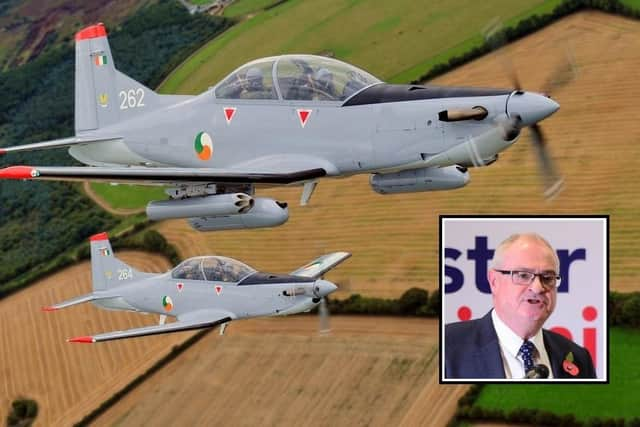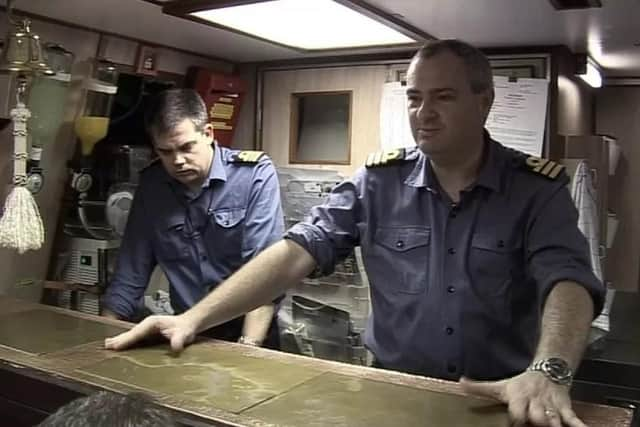Ex-nuclear submarine commander dubs Irish government 'freeloaders' over lack of military power and dependence on UK and NATO
and live on Freeview channel 276
Steve Aiken, MLA for South Antrim and former UUP leader, made the comments amid renewed reports about Ireland’s vulnerability in the event of an attack, and its dependence on others for its own security.
Outlets like the Irish Times and Sky have shone a light in recent days on claims that a secret pact, dating back to the early days of the Cold War, still means that the RAF is basically in charge of protecting the Irish Republic in the event of an enemy attack.
Advertisement
Hide AdAdvertisement
Hide AdPrior to his political career, Mr Aiken was a Royal Navy officer, initially serving on a frigate shortly after the Falklands War then serving on both diesel and nuclear subs.


“What Ireland really needs to do is have a serious, grown-up conversation about potentially joining something like NATO, because it cannot continue to freeload its security on the rest of Europe, and particularly on the good offices of the United Kingdom and NATO,” he told the News Letter.
What of the idea that a secret defence pact exists between Dublin and London?
“Funnily enough there was always a presumption that there was [a pact], and that it led on from what happened in the Second World War and the use of the neutral corridor from Fermanagh over Donegal [largely so the RAF could attack the Germany navy].
"But there was never any more real detail about that.


Advertisement
Hide AdAdvertisement
Hide Ad"The real issue obviously is not only is the question of air defence being provided by the RAF, but it’s the lack of any surveillance capability that the Irish Defence Forces have.
"I mean, it can’t survey it’s maritime space, and it can’t survey it’s airspace
"So if any aircraft that’s operating – or indeed any ship – comes into its extended economic zone or even it’s territorial seas or airspace, Ireland hasn’t got a clue whether it’s there or not; if it switches off its transponder, none of it will be able to be tracked.”
(More on this below – see ‘WE RELY ON THE BRITISH TO TELL US WHAT IS IN OUR OWN AIRSPACE!’)


And this is not just a gift to any hostile enemy force.
Advertisement
Hide AdAdvertisement
Hide Ad"If anybody’s involved in illegal smuggling of drugs, or bringing in illegal migrants, or any of those sorts of things, they don’t know! They’ve got absolutely no clue at all what’s happening,” said Mr Aiken.
The Irish navy just took delivery of two second-hand warships from New Zealand this week.
But since, according to the Irish Examiner, the Republic only inducted 15 new sailors into its ranks in 2022, each ship is “just going to sit in a dock somewhere for a year or two until they can actually find some people to take it to sea”.
Mr Aiken added: “The UK has always been about helping to defeat both fascism and communism. We’re a founder member of NATO.
Advertisement
Hide AdAdvertisement
Hide Ad"You can’t be militarily neutral, and not neutral on other issues. That just doesn’t make any sense.
"And their so-called triple lock, which means they have to have UN approval before they use force: so they’re going to rely on Russia and China to give them approval before they’re able to use its forces to prevent aggression against Europe?
"It’s just completely nonsensical.”
He detects that “there’s definite movement” on the issue nowadays, and that “the sooner Ireland gets into NATO, the better”.
• IRELAND CAN’T SEE ENEMY CRAFT, OR SHOOT THEM IF IT COULD •
The idea of an Irish-UK airspace defence pact has a long history, and sporadically appears in news reports in both jurisdictions.
The pact itself reportedly dates back to 1952.
Advertisement
Hide AdAdvertisement
Hide AdAnd indeed a law was passed in Dublin that year, giving the Irish foreign minister the power to permit foreign military overflights, something which may lend weight to this claim (see details below, FOREIGN MINISTER CAN OKAY MILITARY FLIGHTS).
But there’s never been an official acknoweledgement of what the specific terms of this pact are, nor even of its existence.
The most recent eruption of media interest in the issue appears to stem from an article on May 8 in the Irish Times.
It was headlined "Who protects Irish skies? The secret air defence deal that dates back to the Cold War".
Advertisement
Hide AdAdvertisement
Hide AdThe piece said that "according to interviews with political, diplomatic and military figures, such an agreement goes back over 70 years to the early days of the Cold War and has been updated and amended several times over the decades with the approval of cabinet".
Then on Sunday Sky News carried detailed quotes from retired Irish military pilot Kevin Phipps, in which he said it was "an open secret" that such a pact existed.
Another "open secret" was that Ireland's only fighter plane – the subsonic, turboprop Swiss PC9 – "doesn't have is to intercept fast-moving aircraft".
Nor can it fly above 10,000ft, meaning it would be useless for attacking a rogue airliner, because they cruise at over 30,000ft.
Advertisement
Hide AdAdvertisement
Hide AdBy contrast the MoD says the RAF has 137 Eurofighter Typhoons (capable of flying at 65,000ft and at speeds of over 1,300mph), plus another 29 F35s (50,000ft, with max speed of about 1,200mph).
• ‘WE RELY ON THE BRITISH TO TELL US WHAT IS IN OUR OWN AIRSPACE!’ •
A search of Hansard reports reveals that as well as intermittent interest from the press, the matter has surfaced on and off for many years in the UK and Irish parliaments.
In 2017, Fianna Fail TD Mark MacSharry demanded answers from the government about this "bilateral air defence agreement between us and the British".
He had said: "I am very concerned about it because I do not recall the issue coming before the Oireachtas since the agreement came into being.
"I believe it was renewed in August.
Advertisement
Hide AdAdvertisement
Hide Ad"It is in contravention of Article 15.6 of the Constitution which states only the Oireachtas can make such a move…
"The Oireachtas is entitled to know what exactly is going on because the agreement allows British aircraft to enter Irish airspace."
(The News Letter has not been able to find a reply to his concerns in the Dail’s Hansard record.)
More recently, in 2022 the former head of the Irish Aviation Authority Dr Peter Kearney appeared before the Dublin parliament’s Joint Committee on Transport and Communications.
Advertisement
Hide AdAdvertisement
Hide AdHe revealed that if the pilot of a hostile aircraft turns off his transponder, his plane will be invisible as it flies towards Ireland because the nation has no RADAR capable of picking it up.
In other words, Irish authorities would be unaware that attackers had breached their airspace and were closing in... "that is, unless the UK informs the authority that it has taken place" (as committee chairman Kieran O'Donnell ruefully remarked).
This troubled Fianna Fail TD James O'Connor, who was forced to conclude that Ireland "must potentially rely on British intelligence and its defence infrastructure to inform us what is going on in our own airspace…
"It is a hole that we need to fill. It is a very basic anomaly.
Advertisement
Hide AdAdvertisement
Hide Ad"It should be an urgent priority for our own airspace that we would be able to detect what is in it.
"We do not know unless the British tell us what is coming through our own airspace."
A few months later in the House of Commons, Ian Paisley raised the issue of a 2020 incursion of Russian planes into Northern Irish airspace.
Reacting to this breach had meant "the UK Government had to seek Republic of Ireland support to enter its airspace in order to escort those bombers out," he said.
Advertisement
Hide AdAdvertisement
Hide Ad"We have an excellent relationship with the Irish Government on security matters," replied James Heappey, a junior minister at the MoD.
"It is clearly not for me, at the Dispatch Box of the UK Parliament, to talk about Irish policy over the use of its airspace.
"The honourable gentleman will know, however, that RAF jets have deployed into Irish airspace on occasion. It is for the Irish Government to set out their policy on why, when and how."
• IRISH FOREIGN MINISTER CAN OKAY MILITARY FLIGHTS •
Foreign military flights over and into Irish airspace are not uncommon.
Advertisement
Hide AdAdvertisement
Hide AdIn March this year alone, there were 29 military "overflight requests" received by the Irish authorities – with Germany being the most frequent requester.
Meanwhile there were 52 military landing requests – overwhelmingly from the USA, and mainly for Shannon Airport.
Under a law called the Air Navigation (Foreign Military Aircraft) Order, 1952, Ireland's foreign affairs minister is in charge of permitting overseas powers to use Irish airspace.
The order says that "no foreign military aircraft shall fly over, or land in, the state without the express invitation or permission of the minister”.
Advertisement
Hide AdAdvertisement
Hide AdIt also spells out that requesting parties "are routinely required to include confirmation... that the aircraft is unarmed; that it carries no arms, ammunition or explosives; and that it will not engage in intelligence gathering".
However, under a 1959 deal, there’s an exception.
American overflights are permitted without prior notification – "on condition that the aircraft are unarmed" and "carry only cargo and passengers" (though Ireland’s foreign ministry hints that if the USA wants to fly armed aircraft over Ireland, it can request "advanced permission" to do so).
An article in the UK Defence Journal by military journalist Geoge Allison, dated 2022, said while the UK is not committed to defending Ireland, "in short and simple terms, the UK is protecting its own airspace and Ireland benefits from that".
So how much of a surprise would it be if an Irish-UK pact to defend Ireland did in fact exist?
Advertisement
Hide AdAdvertisement
Hide AdAfter all, whilst not a member of NATO, Ireland is a member of its "Partnership for Peace Programme".
NATO describes this as an agreement "to increase stability, diminish threats to peace and build strengthened security relationships between NATO and non-member countries in the Euro-Atlantic area".
And in 2015, London and Dublin signed a memorandum of understanding to "enhance bilateral engagement on certain aspects of defence".
This commits to them sharing classified information, working on "strategic surveillance" together on sea, air, and land, and developing "a common understanding of national defence and security issues at both the political and the military level".
More from this reporter:
Advertisement
Hide AdAdvertisement
Hide Ad